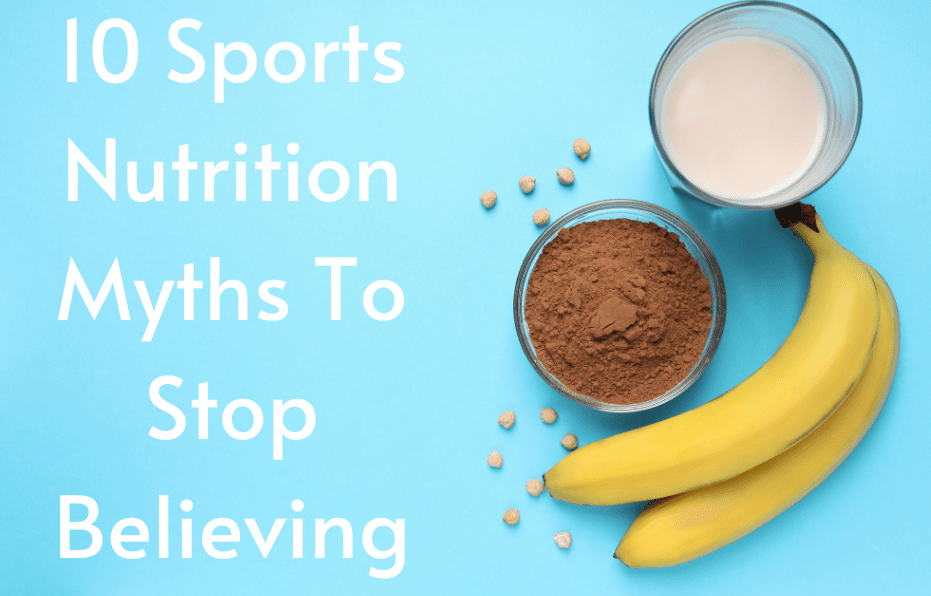Common Sports Nutrition Myths Debunked
Sports nutrition is a vital aspect of any athlete’s training regimen. However, with so much information available online, it can be difficult to separate fact from fiction. In this article, we will debunk some of the most common sports nutrition myths to help you make informed choices about your diet and optimize your performance.
Myth #1: Protein is the only important nutrient for athletes
While protein is essential for muscle repair and growth, it is not the only nutrient that athletes need to perform at their best. Carbohydrates are another crucial component of an athlete’s diet, as they provide the energy necessary for intense physical activity. In fact, many endurance athletes rely on carbohydrates as their primary source of fuel during training and competition.
Additionally, fats are important for overall health and can serve as a source of energy during prolonged exercise. Vitamins and minerals play a key role in numerous physiological processes and are essential for optimal performance and recovery. Therefore, a well-rounded diet that includes a variety of nutrients is essential for athletes.
Myth #2: You need to load up on supplements to perform your best
While supplements can be helpful in certain situations, they are not a substitute for a healthy, balanced diet. Many athletes believe that they need to take a multitude of supplements to reach their peak performance, but this is simply not true. In fact, excessive supplementation can be harmful and may lead to nutrient imbalances or toxicities.
It is always best to focus on obtaining nutrients from whole foods whenever possible. If you have specific nutrient deficiencies or dietary restrictions, consult a registered dietitian or sports nutritionist to develop a personalized supplementation plan that meets your individual needs.
Myth #3: Carbs are bad for athletes
Carbohydrates have gotten a bad rap in recent years, with many people believing that they are responsible for weight gain and poor health. However, for athletes, carbohydrates are essential for optimal performance and recovery. Carbohydrates are the body’s preferred source of energy during exercise, especially high-intensity activities, and help replenish glycogen stores in the muscles after a workout.
It is important to choose complex carbohydrates such as whole grains, fruits, and vegetables, over simple sugars like candy or soda. These complex carbohydrates provide a steady source of energy and essential nutrients that are beneficial for athletes. The key is to consume carbohydrates in moderation and timing them around your workouts to maximize their benefits.
Myth #4: Hydration doesn’t impact athletic performance
Proper hydration is essential for athletic performance, as even mild dehydration can negatively impact strength, endurance, and coordination. Many athletes underestimate the importance of staying hydrated before, during, and after exercise, which can lead to decreased performance and increased risk of injury.
It is recommended that athletes drink water throughout the day and consume fluids before, during, and after workouts to maintain optimal hydration levels. Electrolyte-containing beverages can be beneficial during intense exercise sessions lasting longer than an hour to replace lost fluids and minerals. Listen to your body’s thirst cues and aim to consume enough fluids to stay adequately hydrated.
Myth #5: The more protein, the better
While protein is essential for muscle repair and growth, consuming excessive amounts does not necessarily translate to greater gains in strength or performance. The body can only utilize a certain amount of protein at a time, and excess protein is typically converted to fat or excreted by the body.
Studies have shown that most athletes require around 1.2 to 2.0 grams of protein per kilogram of body weight per day to support muscle repair and growth. Consuming high-quality protein sources such as lean meats, poultry, fish, dairy, eggs, legumes, and plant-based proteins is recommended to meet your protein needs without overdoing it.
Conclusion
By debunking these common sports nutrition myths, we hope to provide you with the knowledge and tools necessary to make informed choices about your diet and optimize your athletic performance. Remember, every athlete is unique, and what works for one person may not work for another. Experiment with different dietary approaches, listen to your body, and consult with a professional if you have specific concerns or questions about your nutrition plan.
Remember, sports nutrition is a journey, not a destination. Continuously educate yourself, stay open-minded, and be willing to adjust your nutrition plan as needed to reach your full potential as an athlete.


